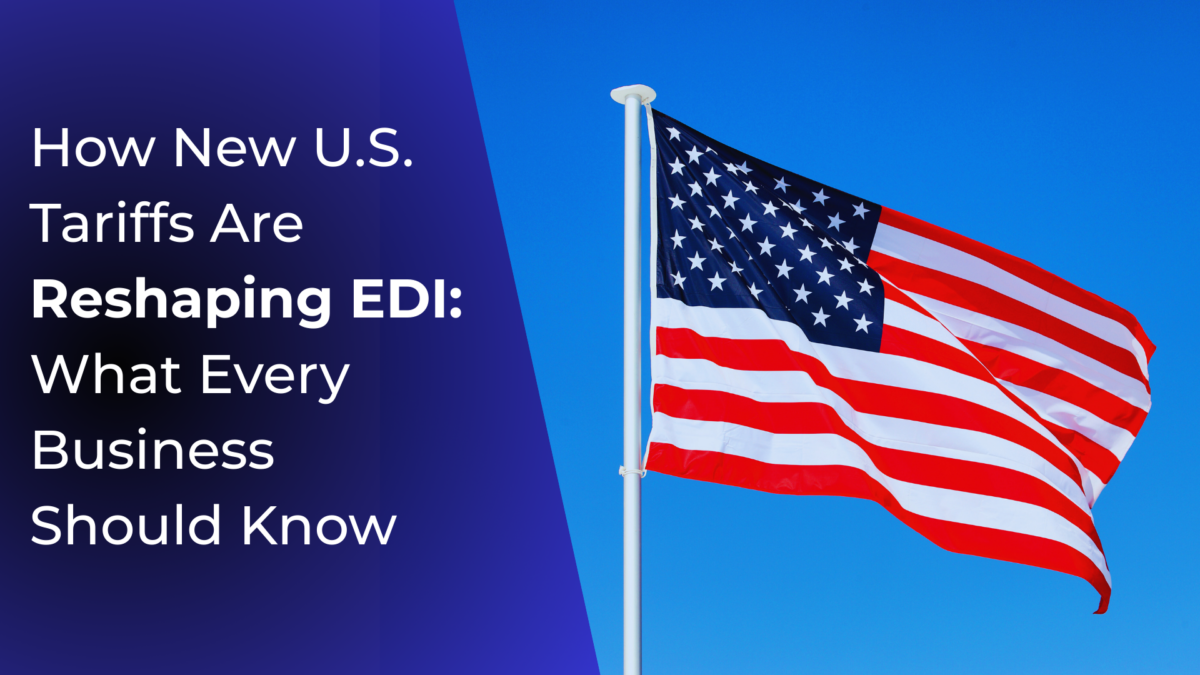The U.S. government has introduced a fresh wave of tariffs targeting key industries like semiconductors, electric vehicles, solar panels and batteries, especially those imported from China. These changes aren’t just a concern for your legal or finance department. They affect how your business sends and receives information through EDI (Electronic Data Interchange).
That’s why now is the time to bring your EDI team to the strategy table. At EDI Partners, we believe that these new tariffs, while challenging, offer a chance to make your EDI systems stronger, smarter and more prepared for the future.
Tariffs Are Now a Technology Matter- Not Just Finance
In the past, tariff updates mostly landed on the desks of legal teams or accountants but not anymore now.
Today’s changes go deeper, requiring businesses to adjust how they manage their supply chains, handle orders, send invoices and communicate with customs and logistics partners. All of this happens through EDI.
If your EDI systems aren’t updated to reflect these changes, your business could face delays, rejections or even compliance issues.
EDI Documents That Are Most Affected by the Tariff Changes
Let’s break it down into simple terms. Here are the main EDI documents being directly impacted:
1. Purchase Orders (EDI 850)
Tariffs often lead to changing suppliers or splitting orders. That means your purchase orders need to include updated product codes, supplier IDs and new delivery instructions, fast and accurately.
2. Invoices (EDI 810)
Your invoices must now include:
- Tariff surcharges
- Updated HS codes
- Adjusted product pricing
- Clear duty-paid or unpaid terms
If your invoice format doesn’t support these, or if your partner can’t read them, payments might be delayed.
3. Advance Ship Notices (EDI 856)
ASNs must now show:
- Country of origin
- Correct item classification
- Shipment value
This information helps customs process goods smoothly and avoids unnecessary hold-ups at borders.
4. Customs & Logistics Documents
Files like:
- EDI 309 (Customs Manifest)
- EDI 346 (Customs Response)
- EDI 997 (Acknowledgements)
All need to be checked and possibly updated to meet the new rule and work with customs brokers bonded warehouses.
It’s Not Just About Invoices- It’s About Your Entire EDI System
Smart companies aren’t only updating invoices, they’re reviewing their whole EDI setup.
Here’s why:
- EDI 832 (Product Catalogs): You may need to update pricing and product categories.
- EDI 846 (Inventory Status): Supply chain delays from new tariffs mean your stock availability might change.
- EDI 940/945 (Warehousing Shipments): Goods might need to be rerouted through new locations.
All of these affect how you communicate with suppliers, warehouses and partners.
Why You Need Your EDI Partner In the Room
EDI isn’t just “backend tech.” It’s the glue holding your trade operations together. The new tariffs show just how important it is.
Here’s what a good EDI partner can help you do:
- Map all necessary updates across your systems.
- Ensure your EDI data works with your partners’ platforms.
- Prevent customs delays or document rejections.
- Onboard new suppliers faster.
- Keep a solid audit trail for compliance checks
5 Things You can Do Today to Stay Ahead
If you’re feeling overwhelmed, don’t worry. Start with these five steps:
- Review your current EDI mappings, do they handle new tariff data?
- Check with partners, can they receive updated documents?
- Test your purchase orders, invoices and shipping details.
- Talk to customs brokers and logistics providers about new needs.
- Schedule a tariff-readiness.
Let’s Turn These Tariff Challenges into Growth Opportunities
We understand that tariff updates can feel like another hurdle. However, at EDI Partners, we see this as an opportunity to improve, automate and future-proof your EDI environment.
Whether you need to adjust existing documents, onboard new suppliers, or stay in line with global customs rules, we’re here to help. Contact us today.
- What is EDIFACT? A Beginner’s Guide to the Global EDI Standard - September 18, 2025
- Top Challenges of EDI Interface Integration and How to Overcome Them - September 18, 2025
- AI‑Driven EDI: How Artificial Intelligence Is Transforming EDI Consulting in 2025 - August 21, 2025

